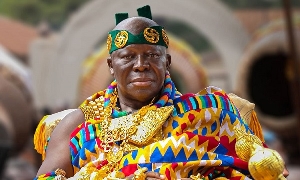- Home - News
- TWI News | TV
- Polls
- Year In Review
- News Archive
- Crime & Punishment
- Politics
- Regional
- Editorial
- Health
- Ghanaians Abroad
- Tabloid
- Africa
- Religion
- Election 2020
- Coronavirus
- News Videos | TV
- Photo Archives
- News Headlines
- Press Release
Editorial News of Sunday, 30 April 2000
Source: Ghanaian Chronicle
Africa's Development - Too Much Religion
Accra - I 'And God said, Let us make man in our image, after our likeness: and let them have dominion over the fish of the sea, and over the fowl of the air, and over the cattle, and over all the earth. Gen: 1,26
According to the Bible, the centerpiece of God's creation is man; which is why He tasked him with the responsibility of having dominion over the earth. And God made this possible by endowing man with such enormous qualities and capabilities as are not to be found in any other species in all of God's creation.
Taking dominion of the earth has required a different level of preparedness from one age to another; from those early times when human beings lived completely in nature, solely preoccupied with physical survival, to this age of the 21st century when man has in his hands the unimaginably powerful technologies of genetics, nanotechnology and robotics. When we raise our sights we are now able to contemplate, not just earthly confines, but the vast reaches of the heavens. And just last month a 17-year-old girl in New York state, Viviana Risca, encrypted data in a strand of DNA.
All the advances that the world has seen, from the day of creation to this day, have less to do with prayers than the determination of societies to take dominion over the world: in obedience to God's very first commandment to man. If development had anything to do with faith, Africa would have been the most developed region of the world; we believe the most, and pray the most. And yet we are the poorest and least developed.
The only way to progress and development is to learn to do things for ourselves; the absence of that creates in us a heavy dependence on God, with such petty demands and expectations that actually make God Himself seem petty. A fall in the level of the Volta creates an energy crisis, and call go out for national prayers; the possibility of a major earthquake in Accra is discussed in order that we know what to do, and the general response is for all of us to go down on our knees and pray; even a workers' union has called for prayers to settle a labour dispute.
In recent times the proliferation of churches, with their thousand and one pastors and bishops, has been blamed for the excessive religiosity of the Ghanaian. I cannot agree with this point of view. On the contrary, the evil and corrupt activities of churches and their pastors are themselves a creation of the socioeconomic inadequacies of our time. A large proportion of the population is uneducated, unskilled, and without jobs. Even among those with gainful employment, there are still many who are unable to sustain decent levels of livelihood.
Life in many communities has become a long stretch of daily miseries, driving the youth into drugs, crime and sex. And although people are convinced of the profound badness of all they see around them, they find themselves powerless to alter them. In these circumstances, individuals are driven to the quiet conviction that it is possible to be personally perfect in an imperfect world. This creates the breeding ground for the churches of miracles and salvation.
The matter of God's desire for man to take dominion over the world cannot be of interest to the low-spirited in search of a spiritual quick fix; something more emphatic and melodramatic is required; something that not only gives meaning to the meaningless turbulence of life in contemporary Ghana, but also offers assurance for inner calm and serenity. For that, the pastors find potency in Eph. 6,12: "For we wrestle not against flesh and blood, but against principalities, against powers, against the rulers of the darkness of this world, against spiritual wickedness in high places."
While other cultures have, consciously or unconsciously, allowed their actions to be guided more or less by Gen, 1, 26-28, we in Ghana (and most of Africa) have chosen, consciously or unconsciously, to be led more or less by the spirit of Eph, 6, 11-13. A failure in business or in school examination, a marriage that doesn't work, ill health, poverty; everything in our lives that is undesirable, is caused, not by what is ascertainable through a cause-and-effect analysis, but by the devil, more specifically, a witch, bayie, in the family or neighbourhood. The whole atmosphere is charged full with witches and witches and witches. And the only source of succour? The pastor.
It should be easy to see how come so many people place themselves in the total power of these churches. The pastor solves financial problems, cures poverty and unemployment, strengthens marriages and businesses, cures all diseases. An advert on the Accra radio station, Joy FM, on May 7, 1997: "Are you under spiritual attack? Do you have problems in your marriage? Economic problems? Do you seek progress in your business or married life? Deal with all your problems through the power of Jesus. Come to (name of church withheld) and solve your difficulties through the power of Jesus." In Accra, these churches and their so-called men of God - priests, pastors, reverends, bishops - that whole army of pious frauds, advertise their wares on radio and television with aggressiveness and consistency unequalled by soap and beer sellers.
Where is all this leading us?
Before the European brought us his Christianity (or the Arab his Islam), Africans had various belief systems with God as the Creator, belief systems which, for reasons of cultural arrogance, the European labeled as fetish. The priest, okomfo, was believed to have the power to cure all diseases, physical and spiritual, and to alleviate all kinds of suffering. I grew up surrounded by their practices, and I came to distrust them profoundly. But apart from the okomfo using a whisk, and the pastor using the Bible, as their individual tools of trade, there is nothing the okomfo has done to incur my distrust which the pastor is not doing with greater charlatanism; in great essence, both are consulted by the needy and the distressed, and both promise what is not within their power to deliver.
If we have been able to leave behind us the unscientific methods of old, why should we take on modern, more powerful methods of deception whose only result is the totally undeserved power and prestige that pastors have come to acquire. With the possible exception of one or two who preach about the merit of human effort, the rest are poised to lead us down the garden path of self destruction. For in their unrelenting sermons of a reliance on the supernatural, there is no place for character, intelligence, endurance, public-spiritedness and courage; virtues which, if present in us, truly reflect the image of God in which we have been created; virtues which alone guarantee a happy life on earth. And God meant life on earth to be happy and desirable, otherwise He would have created heaven alone, and no earth.
The overwhelming influence of the pastor is making us all more and more naive, less and less analytical. Dependency on him is such that there is nothing we won't do for his church; we give to it our money, our time, and our every effort. And so in Ghana today, the charismatic church is the one business guaranteed to succeed, and its pastor the one person whose elegant lifestyle is assured.
If these miracle performers can truly cure diseases, why don't they go over to the centres for the deaf and the blind to cure them? If they make it possible for people to find jobs, aren't they aware of the huge unemployment problem on our hands? For once I found myself agreeing entirely with President Rawlings, though in the past when it suited him, it was he who gave active support and encouragement to some of these churches and their men of God.
Should we expect the pastor to give all that up, to begin to preach edifying sermons, and risk losing everything? A man of substance could do that, as a few of them do, and still succeed with people; but that is possible only with the far-sighted. But since the generality of our pastors are mere mountebanks, ready to make the most of what is available here and now, they will continue to sell nothing but the user-friendly product of the supernatural.
Therefore, if change must come, it must start not with a change of heart in the pastor, but the strengthening of the mind and character of the Ghanaian. Without our gullibility, most of these churches would simply disappear.
One early Saturday morning a couple of years ago, I accidentally tuned in to a religious programme on Joy FM (I had expected the BBC news.) It was an interactive programme that allowed listeners to phone in. I was shocked, as other people are by similar programmes on other FM stations, by the pettiness of the "problems" for which people thought they stood in urgent need of prayers. I have made a conscious effort to forget them all. Except one, which was simply grotesque.
This young man had a problem of maintaining a lasting relationship with any girl he had fallen in love with, because his penis happened to be small in size; and the three or so pastors in the studio that morning soulfully prayed to Jesus to as it were give size to the poor man's penis! I couldn't believe my ears.
There is no miracle greater than the mind that God put into the head of man. The human mind, together with the hands, has built cathedrals and aeroplanes, spliced the atom and worked out the human genome. God has given us all fine minds and hands. If we in Africa determine to cultivate ours, Africa's seemingly unsurmountable problems will be no problem. Religion may have its place, but it is no replacement for the proper application of human faculties.










